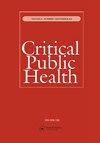The quest for health and the unhealthy ‘others’. A critical case study of Syrian women newcomers’ meeting with health promotion and civic integration discourses upon arrival in Denmark
IF 2.3
3区 医学
Q2 PUBLIC, ENVIRONMENTAL & OCCUPATIONAL HEALTH
引用次数: 0
Abstract
ABSTRACT Increasingly restrictive immigration policies and political attention to newcomers’ civic integration currently intersect with the individualisation of the responsibility for health care and health promotion in Western societies. We aim to examine how such policies shape women newcomers’ perceptions of health and experiences of civic health promoting activities in the first years after granted asylum and temporary residence permit in Denmark. Drawing on conceptualisations of healthism as a super-value for the individual in Western societies, we analyse 29–50 year old Syrian women newcomers’ experiences of meeting an all-encompassing and individualised concept of health that is promoted by various societal institutions in Denmark (including schools and leisure sites). While the women describe their everyday lives in Syria as unconsciously healthy, in the receiving context, they came to appear as consciously unhealthy. Further through individual and focus group interviews, the women characterise white Danish women as a healthy and active group, while describing themselves as the ‘unhealthy others’. The Syrian women take on feelings of blame and individual responsibility for promoting their health, despite also describing a number of structural barriers for their healthy and active living. However, the Syrian women newcomers also deliver an implicit critique of the individual quest for health in Western societies and showcase more collective approaches to health care.对健康和不健康的“他人”的追求。对叙利亚妇女新移民抵达丹麦后与促进健康和公民融合的谈话进行的重要案例研究
摘要限制性移民政策和对新移民公民融合的政治关注,目前与西方社会医疗保健和健康促进责任的个性化相交叉。我们的目的是研究这些政策如何影响新移民妇女在丹麦获得庇护和临时居留许可后的头几年对健康的看法和公民健康促进活动的经历。根据西方社会中健康主义作为个人超价值观的概念,我们分析了29-50岁的叙利亚新女性在满足丹麦各种社会机构(包括学校和休闲场所)倡导的包罗万象的个性化健康概念方面的经历。虽然这些女性将她们在叙利亚的日常生活描述为无意识的健康,但在接受采访的背景下,她们开始显得有意识的不健康。通过个人和焦点小组访谈,这些女性将丹麦白人女性描述为一个健康活跃的群体,同时将自己描述为“不健康的他人”。叙利亚妇女在促进健康方面承担着责任和个人责任,尽管她们也描述了健康和积极生活的一些结构性障碍。然而,叙利亚新女性也含蓄地批评了西方社会对健康的个人追求,并展示了更多的集体医疗方法。
本文章由计算机程序翻译,如有差异,请以英文原文为准。
求助全文
约1分钟内获得全文
求助全文
来源期刊

Critical Public Health
Multiple-
CiteScore
5.90
自引率
7.10%
发文量
36
期刊介绍:
Critical Public Health (CPH) is a respected peer-review journal for researchers and practitioners working in public health, health promotion and related fields. It brings together international scholarship to provide critical analyses of theory and practice, reviews of literature and explorations of new ways of working. The journal publishes high quality work that is open and critical in perspective and which reports on current research and debates in the field. CPH encourages an interdisciplinary focus and features innovative analyses. It is committed to exploring and debating issues of equity and social justice; in particular, issues of sexism, racism and other forms of oppression.
 求助内容:
求助内容: 应助结果提醒方式:
应助结果提醒方式:


